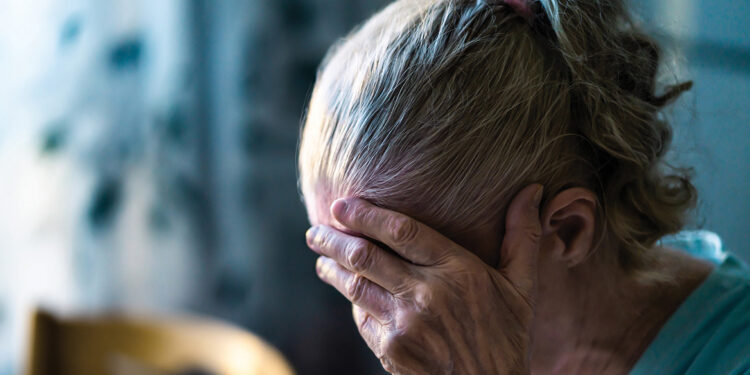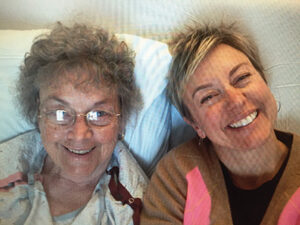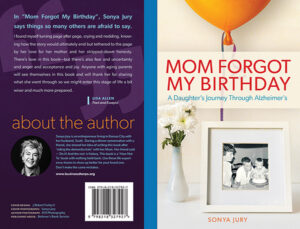The Reality of Alzheimer’s: Stages, Caregiving, and Support

Article by Amy Stewart
The weight of Alzheimer’s extends beyond those diagnosed, falling heavily on the shoulders of caregivers. This June, during Alzheimer’s & Brain Awareness Month, we recognize the more than 11 million Americans providing unpaid care for loved
ones with dementia.
With dementia affecting over 55 million people globally, and 7 million Americans living with Alzheimer’s, the need for awareness, caregiving support, research, and treatment is growing. Sonya Jury underscores this need in her book, “Mom Forgot My Birthday: A Daughter’s Journey Through Alzheimer’s,” where she shares her story of caring for her mother, Dean, who was diagnosed in 2012.
“I wrote this book and joined the board for the Alzheimer’s Association Heart of America Chapter to raise awareness of the disease and to share the lessons I learned with other caregivers,” said Sonya. “I consider my book a ‘how-not-to’ guide to help others show up better for their loved ones and hopefully learn from my mistakes.”


Sonya Jury
The Difference Between Dementia and Alzheimer’s
According to the Alzheimer’s Association, dementia is a general term for symptoms like decline in memory, reasoning, or other thinking skills. Alzheimer’s is the most common disease that causes dementia. Other diseases that can cause symptoms of dementia are Frontotemporal degeneration, Lewy Body, and vascular disease.
In May of 2012, Dean was admitted to the hospital due to low sodium resulting in severe diarrhea, while she was there, she was diagnosed with dementia. At the time, Sonya didn’t know anything about it.
“A few weeks after Mom’s dementia diagnosis was my 47th birthday,” said Sonya. “She always sent me a card with the envelope covered in stickers and birthday salutations in the mail. I always looked forward to it. But that year it never came. Mom called me the day after my birthday to discuss something completely different, and as I got off the phone my heart just broke. I thought, ‘How could Mom forget my birthday?’ And that’s when I knew something was really wrong.”
The Stages of Alzheimer’s
Sonya’s book is broken up into three parts, which mirror the three stages of Alzheimer’s, which are outlined on the Alzheimer’s Association website.
Early-stage Alzheimer’s (mild) – Common difficulties include:
• Coming up with the right word or name
• Losing or misplacing a valuable object
• Forgetting material that was just read
Middle-stage Alzheimer’s (moderate) – Symptoms may include:
• Being forgetful of events or personal history
• Experiencing confusion about where they are
or what day it is
• Showing an increased tendency to wander and
become lost
Late-stage Alzheimer’s (severe) – Individuals may:
• Require around-the-clock assistance with daily
personal care
• Have difficulty communicating
• Lose awareness of recent experiences as well as of
their surroundings
 “Prior to Mom’s dementia diagnosis, there were a number of signs that I missed,” said Sonya. “She had stopped driving, and she was no longer interested in cooking or gardening, things she had always loved to do. She started asking her husband, Walt, for permission or to validate a comment she would make. This was not like her and was something that I noticed, but I didn’t know it was a sign of dementia.”
“Prior to Mom’s dementia diagnosis, there were a number of signs that I missed,” said Sonya. “She had stopped driving, and she was no longer interested in cooking or gardening, things she had always loved to do. She started asking her husband, Walt, for permission or to validate a comment she would make. This was not like her and was something that I noticed, but I didn’t know it was a sign of dementia.”
Caring for a Loved One with Alzheimer’s
When Dean was first diagnosed with dementia, she was living with Walt, and he was her primary caregiver. Additionally, he took over all of the household chores that Dean had managed in the past including cooking, cleaning, and laundry. Sonya encouraged him to get help, but he wouldn’t accept it. In October of that year, he came down with pneumonia, ended up in the hospital and passed away that November.
This made Sonya the primary caregiver for Dean. Over the next 5 years, she would work to ensure her mother was happy and safe.
“Thankfully today, there is support and information available to help you on your caregiving journey,” said Sonya. “In the beginning I wanted to ‘fix’ Mom, but then I realized there was no cure, and I shifted my energy to making sure she was happy and safe. It made all the difference in how I handled caregiving.”

As a Certified EOS Implementer, Sonya Jury founded Business Sherpa to help entrepreneurs and business owners take their businesses to new heights. She lives in Kansas City, MO with her husband, Scott, who offered his unwavering support through her journey caring for her mother with Alzheimer’s and ultimately writing her book.
Sources: alz.org/alzheimers-dementia/stages




